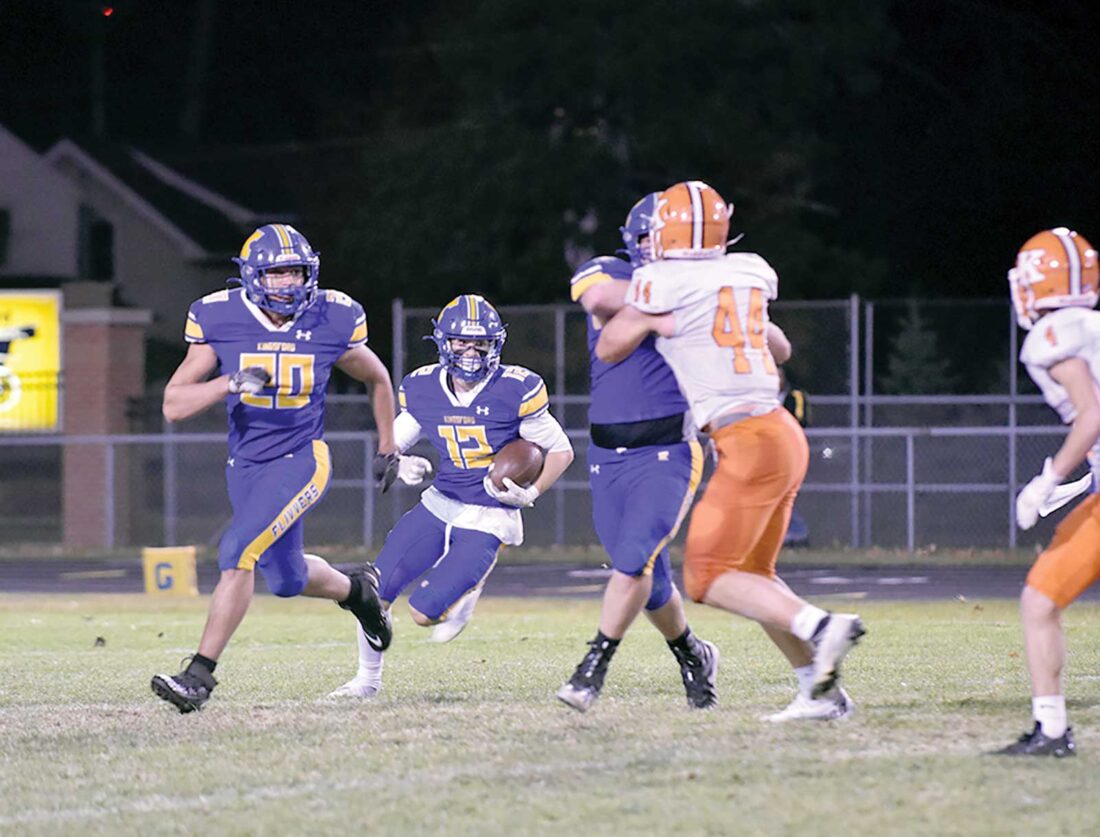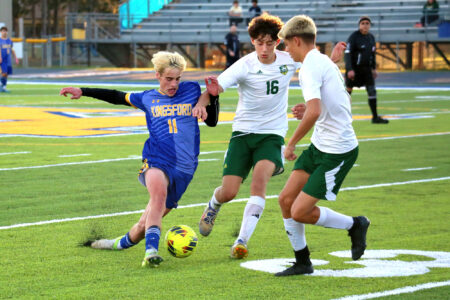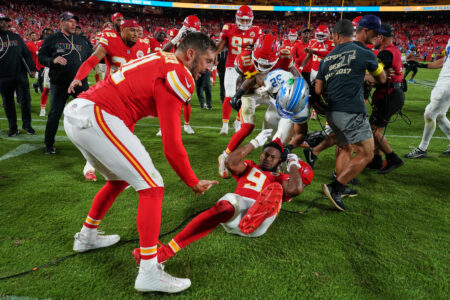Time to realign: Marquette looks to join cross-peninsula conference as GNC breaks up in football

Kingsford running back Cole Myllyla (12) gets some help from his teammates, including fellow back Elizen Rouse (20), in running the ball against Kingsley during the Flivvers’ thrilling 34-30 playoff win over the visiting Stags on Oct. 28. With the demise of the Great Northern Conference as far as football, Kingsford next fall will compete in the West PAC. (Dennis Mansfield/Daily News file photo)
MARQUETTE — Marquette athletic director Alex Tiseo thinks his school has found a long-term solution for its problems in scheduling football games.
For football only, the Great Northern Conference will no longer exist as Marquette and fellow league member Escanaba will become part of the previously all-Lower Peninsula Big North Conference.
In addition, the other three GNC members — Kingsford, Menominee and Gladstone — have been accepted as football members of the West PAC, the current league that includes Negaunee, Ishpeming, Westwood and Gwinn.
The new seven-school Big North will have a nearly equal Upper Peninsula-Lower Peninsula balance, so league meetings might make sense to be scheduled in St. Ignace or Mackinaw City.
Leaving the Legends Division of the Northern Michigan Football Conference, Sault Ste. Marie will join Marquette and Escanaba as the U.P. members of the league.
The other four Lower Peninsula schools are the current members of the Big North in football — Petoskey, Alpena, Gaylord and Cadillac.
Two other schools that are Big North members in other sports had already departed in football — Traverse City Central and West.
The Trojans and Titans were members of the Saginaw Valley League this past fall. It’s a league that used to have schools from its “title” city — Saginaw — along with Flint and Pontiac, but now just includes Mount Pleasant, two schools in Midland and two in Bay City.
Again, the league realignment only applies to football, while nearly every other sport, such as basketball and volleyball, will continue to have the Great Northern Conference with its current five schools.
All the rearranging has been prompted by two forces — the proliferation of eight-player football and a change in the playoff points system by the MHSAA.
In this season just ended, for the first time eight-player pulled ahead of 11-player in the number of participating U.P. schools, with 20 eight-player and 18 in the 11-player version of the sport.
Those numbers were made available at the U.P. Sportswriters and Sportscasters Association meeting in November in Marquette.
It’s not a bad thing, as many if not most Class D-sized schools may have been forced to join a cooperative or just dropped the sport altogether if it wasn’t for the eight-player game.
Some schools, like Superior Central, had never offered football before the eight-player game came along.
The first reaction to the shrinking pool of 11-player teams in the U.P. came when the Mid-Peninsula Conference merged with the West PAC in the last decade.
Several other conferences, like the Central U.P., Skyline and Great Western, just disappeared altogether as far as football was concerned as most or all of their members went to eight-player.
There originally were enough teams in the enlarged West PAC’s two divisions that the GNC was shut out from playing nonleague games against them, forcing schools like Marquette to look to the Lower Peninsula for opponents.
That’s eased in the past few years as even the West PAC has shrunk enough to require a few nonconference games to fill out its teams’ schedules.
But a lot of U.P. 11-player schools still resist scheduling opponents a lot bigger than them in terms of enrollment, Tiseo said.
“Scheduling within the sport of football has never been more challenging for schools, particularly for Marquette and Escanaba, who are viewed as too big for smaller U.P. schools to play and too far away for downstate schools to travel to,” he said in a document outlining the changes.
Then in the past two or three years, the MHSAA changed its playoff qualification system to no longer “guarantee” six-win teams a spot — while it wasn’t an actual guarantee, no six-win team in the two decades it was employed had been left out of the playoffs.
The MHSAA cited findings that too many schools were loading up with inferior opponents just to reach the six-win standard.
So it went back to the old playoff points system, which it had continued to use to determine home field in the first three rounds of the playoffs.
Points are gained mostly from wins based on the division of the opponent and the number of wins it has.
So now it’s prompted schools like Marquette, which plays in Division 3, to look for bigger opponents.
“The MHSAA’s playoff qualification system is based on a points system that encourages schools to schedule similarly sized opponents … and rewards them for scheduling larger sized opponents,” Tiseo said. “This point qualification system is only in place within the sport of football.”
He went on to explain that in the GNC, Marquette is in Division 3, Escanaba in Division 4, Kingsford in Division 5 and Gladstone and Menominee in Division 6.
In the new Big North, every school was in Division 3 this school year except for Escanaba in D-4.
The change to using playoff points bit Sault Ste. Marie this fall as the Blue Devils went 6-3 — meeting the old six-win threshold — but failed to make the playoffs.
Their Legends Division of the NMFC consisted of the Division 3 Blue Devils with all of the rest of the schools in divisions 5, 6 and 7.
Tiseo also mentioned that since the GNC had originally been shut out of scheduling West PAC teams, Marquette had moved to a schedule that included some of the Big North’s Lower Peninsula schools.
This fall, for instance, the Redmen not only played Escanaba as a GNC game, but also Alpena, Petoskey and Gaylord.
And they’ll play Gladstone and Kingsford as nonleague games next fall, meaning six of this fall’s nine opponents will also be on the 2023 slate.
Tiseo added that included in the agreement forming the new Big North was that U.P. members won’t have to travel downstate in consecutive weeks for league games, while downstate members will not have road games at both Marquette and Escanaba in the same season.





